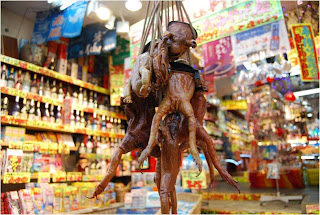Student Profile:
A senior majoring in International Studies East Asia and minoring in Japanese. Beltz spent a year at Sophia University in Tokyo, Japan for the 2008-2009 year.
Standing at a crossroads – wearing a Doraemon costume, a popular Japanese animation character, on Halloween night standing in the busiest pedestrian intersection on Earth – Shibuya
Jonathan's Experience in Japan:
At the study abroad office they told us we should jot down our experiences from the previous year abroad while they are still fresh in our minds. The advisors told us this because we can’t simply make the statement “It was awesome!” to a potential future employer while they interview us. I have already overused that “one-liner” to plenty of friends and family as I am constantly asked about how study abroad went. So I’ve finally devised a response that I feel I can give anyone: potential employers, future study abroad students, family and friends, and anybody else.
[In Japan] this could happen to you. You could find yourself on the last night train home closer to someone you don’t know than you have ever been to someone you do. You could lose yourself on the winding roads through the city and suburbs only to finally find sights and experiences you never imagined. Like scenic views of the setting sun silhouetting the great Mt. Fuji or seemingly simple scenes, smells, and sounds of festivities and music carrying far on into the night. You may make a true friend out of more people in one evening than you ever did in one month “back home.” You will talk to or be talked to in just about any language by just about anyone. Through this you will leap over communication boundaries of great heights even without words, often times simply with the use of expressions and gestures.
For me, the most defining moment of my many defining moments throughout the past year in Japan was actually centered around a whole evening spent not in Tokyo but during which I was visiting a countryside village secluded by mountains and with a history far more significant than its size and location. This was the village of Iga, the origin village of the way of the ninja in Japan. Late at night with the sun down and darkness filling the sky, my friends and I were (after a long day of sightseeing) in a hurry back to the station in hopes we wouldn’t miss the last train – much earlier than the last trains in Tokyo. In need of a bathroom we stopped by a kind of large mom-and-pop shop for souvenirs and knick-knacks. It being out of tourist season it was actually a surprise to find a place even open at all, especially considering the time. There an older man invited us in and his wife showed us the way to the bathroom, both of them all smiles showing the whole time – most likely quite happy to see foreign tourists. By the time the last of us had finished with the bathroom the wife was seating us with tea and some snacks while the husband began talking to us, asking questions, and telling the history and stories about some many old items in a display case. Eventually he came to the point of asking us if we would like to see some other, more fascinating items. When we agreed he began by telling us a story.
Sometime during WW2 his father’s or his grandfather’s company warehouse was burning down and the few people there, including his relative, were forced to grab whatever they could in one armful and run out. A part of this relative’s armful were three swords, pulled from a box of nearly fifty just like them but only similar in age, not make. The swords passed down ending up in the possession of the man we were now talking to. But he warned us that just holding one of these swords would make us tremble in knowledge of its awesome history of power. In other words, that one sword in particular was nearly four-hundred years old and used in a battle which defined the history of Japan to this very day. It was certain by the spotting of rust and nicks and still, in some places, razor sharp blade, that this sword had been used to do a number of killings including the removal of heads. The man allowed us each to hold the sword. At least for me, it sent shivers down my spine and throughout my body. After looking through a few other older weapons and things, including some 17th century blunderbuss-style rifles, we took our leave in the interest of time. But just looking back at this picture brings tears to my eyes because it reminds me not just of that defining moment in Japan, but of all of my other defining moments there.
So to my fellow future study abroad students I say: This could happen to you! You could find yourself holding a piece of history a hundred years older than your own home country of the United States. And to think that in that burning warehouse there were nearly fifty of these!
In my near future, just after graduation, my greatest hope and desire is to return to Japan to work in translations or interpretations for a company in Tokyo. Of course this may be tough to do. English teaching jobs may very well be my best bet and easiest to find. Regardless, much of what I have learned, not just the Japanese language, will aid me in the process of future employment either in Japan, or some other country in the world. I have shown myself my true ability to adapt to most situations and will be able to demonstrate this to employers as well. Furthermore, I have just begun working as an intern in the Office of Education Abroad so that I may have a significant, more direct effect on others who wish to study abroad in the future. This too will be a new and interesting experience for me, something which nowadays I am always on the lookout for.
Standing on Mout Fuji after a long night of climbing; overlooking the vast surrounding scenery of forests and lakes – a truly moving experience.
Pouches made from the bodies of frogs hang in front of a colorful array of souvenirs and sake in this Okinawa tourist shop.
Standing at full draw participating in kyudo: traditional Japanese archery.
Geared up in traditional attire, here I take part in the strenuous act of carrying the portable shrine in the local festival or “matsuri”.
Last but certainly not least, just a few of the millions of vending machines throughout Japan willing to stake their claim on any nook or cranny on any alleyway or street imaginable.







